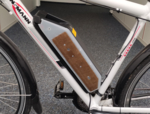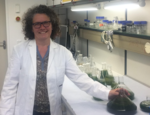-
Alternative construction materials: mycelium-based materials - 20/12/2023
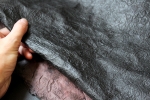
Most of us see fungi as just food - and possibly pathogens. This is a mistake, because these amazing organisms are capable of much more: they grow on plant residues of all kinds, forming a dense and interconnected structure as they spread. The resulting material can be moulded into desired shapes and be turned into new sustainable and economically attractive products such as leather and polystyrene substitutes or building materials.
https://www.biooekonomie-bw.de/en/articles/news/using-fungi-create-sustainable-and-economical-mycelium-based-materials
-
Sustainable binder alternative - 18/12/2023
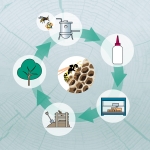
Plastic is all around us; and unfortunately, it is not going away any time soon. The search for more sustainable solutions is fully underway. However, binders that degrade only with difficulty or not at all are still used to bond natural materials such as wood and straw - not yet truly environmentally friendly. Fraunhofer researchers are working on an insect-inspired wood binder that makes bonded wood products both resistant and biodegradable.
https://www.biooekonomie-bw.de/en/articles/news/copied-insects-new-biological-wood-binder-under-development
-
Wasser 3.0: #detect|remove|reuse - 31/10/2023
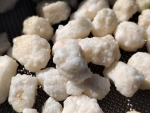
We all pollute our water with things we use in our everyday lives. In the process, microplastics and micropollutants accumulate in sometimes significant quantities and are difficult to remove. This has increasingly devastating consequences for our health and the environment. Wasser 3.0, a non-profit start-up from Karlsruhe, has declared war on this problem by developing a customisable process to detect, remove and even recycle these pollutants.
https://www.biooekonomie-bw.de/en/articles/news/how-sustainably-remove-and-recycle-microplastics-water
-
-
Microorganisms degrade biobased turf infill - 17/10/2023
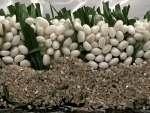
There are thousands of artificial turf pitches in Germany. They are extremely practical, but often not at all environmentally friendly. When it rains or the pitch is used, plastic particles from the rubber granules can be released into the envronment, where they remain. Researchers at the University of Stuttgart along with the company TECNARO are now developing an artificial turf with an infill that biodegrades as soon as it leaves the pitch.
https://www.biooekonomie-bw.de/en/articles/news/eco-friendly-artificial-turf-sports-pitch-s-good-people-and-environment
-
-
Innovative materials - 14/06/2023

Conserving wood by producing furniture and other objects from wood-based materials with the help of microorganisms? That is exactly what a team of researchers from the University of Freiburg and the Leibniz Institute for New Materials (INM) in Saarbrücken is working on in the DELIVER project. The aim is to create a database of materials with a broad range of controllable properties for various applications that can be produced from wood waste.
https://www.biooekonomie-bw.de/en/articles/news/reinventing-wood-programmable-bacteria
-
3D-Thermocell project - 17/05/2023

Replacing plastic – for example in packaging – is not that easy but nevertheless urgently needed. In the 3D-Thermocell project, researchers at DHBW Karlsruhe are currently developing new plastic substitute products made of thermoformable paper as a renewable resource, which should be cheap and light and easy to dispose of along with waste paper. The characterisation and application of demonstration models will start soon.
https://www.biooekonomie-bw.de/en/articles/paper-instead-plastic-sustainable-packaging-good-conscience
-
-
-
Press release - 30/03/2023
Composite materials provide stability in aircraft parts, sports equipment, and everyday household items. However, most of these materials have a poor carbon footprint and are not naturally degradable. A more sustainable alternative has been developed by a team from the University of Stuttgart. This completely bio-based composite material is made of flax fibers and the biopolymer chitosan.
https://www.biooekonomie-bw.de/en/articles/pm/green-composite-material-made-flax-and-chitosan
-
-
-
Press release - 08/12/2022
The German Research Foundation (DFG) has awarded the 2023 Gottfried Wilhelm Leibniz Prize to Prof. Achim Menges, head of the Institute for Computational Design and Construction at the University of Stuttgart. The award, which is endowed with EUR 2.5 million, is considered by many the most important research prize in Germany.
https://www.biooekonomie-bw.de/en/articles/pm/leibniz-preis-fuer-prof-achim-menges
-
-
-
Press release - 06/04/2022
The University of Stuttgart is contributing to innovations for climate protection as part of the EU project "Smart Circular Bridge". An old material is being rediscovered: flax has been with us for thousands of years in the form of clothing, sacks, and robust ship's ropes. Now the plant fibres are experiencing a renaissance and could become the building material of the future.
https://www.biooekonomie-bw.de/en/articles/pm/high-tech-bruecke-mit-flachs-gebaut
-
-
Website address: https://www.biooekonomie-bw.de/en/search






